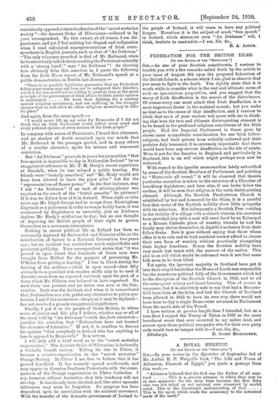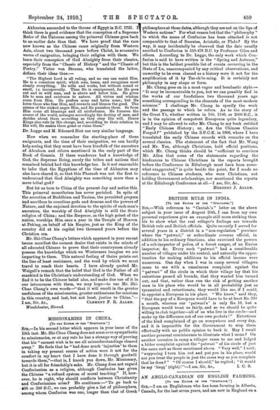A ROYAL HERETIC.
rTo THE EDITOR OF TUE " SPECTATOR:1 SIR,—In your review in the Spectator of September 3rd of Mr. Arthur E. P. Weigall's book, " The Life and Times of Akbnaton, Pharaoh of Egypt," you quote a passage from this work :— " Aklmaton believed that his God was the Father of all man- kind This is a greater advance in ethics than may be at once apparent: for the Aton thus becomes the first deity who was not tribal or not national ever conceived by mortal mind. This is tho Christian's understanding of God. This is the spirit which sends the missionary to the uttermost parts of the earth."
Aklinaton succeeded to the throne of Egypt in B.C. 1725. think there is good evidence that the conception of a Supreme Ruler of the Universe among the primeval Chinese goes back to an earlier date than that. We have proof that the race now known as the Chinese came originally from Western Asia, about two thousand years before Christ, in successive waves of emigration, bringing their religion with them. We learn their conception of God Almighty from their classics, especially from the " Classic of History " and the " Classic of Poetry." Victor von Strauss, who translated the latter, defines their ideas thus :—
"The Highest Lord is all ruling, and no one can resist Him. He is a conscious spirit, which sees, hears, and recognises most dearly everything. He wills and works, but without sound or smell, i.e. incorporeally. Thus He is omnipresent, for He goes out and in with man, and is above and below him. He gives life to man and existence to nature. All virtue and wisdom come from Him. He prefers none and hates none; but He loves those who fear Him, and rewards and blesses the good. The crimes of the wicked anger Him, and He punishes them. So from Him coma all blessings and all misfortunes. He foresees the course of the world, arranges accordingly the destiny of men, and decides about them according as they obey His will. Hence Kings also rule by His charge, and, according to their relation to His will, He makes them great or ruins them."
Dr. Legge and M. Edouard Biot use very similar language.
Now when we remember the starting-place of these emigrants, and the time of their emigration, we can hardly help seeing that they must have been kinsfolk of the ancestors of Abraham and others mentioned in the early part of the Book of Genesis. If these wanderers had a knowledge of God, the Supreme Being, surely the tribes and nations that remained behind had this knowledge too. Is it not reasonable to infer that the Egyptians of the time of Akhnaton may also have shared it so that this Pharaoh was not the first to understand that God Almighty was something more than a mere tribal god ?
But let us turn to China of the present day and notice this. This primeval monotheism has never perished. In spite of • the accretion of Buddhism and Taoism, the permitted prayers had sacrifices to countless gods and demons and the powers of Nature, and the enjoined devotion to the spirits of each man's ancestors, the worship of God Almighty is still the State religion of • China ; and the Emperor, as the high priest of the nation, worships Him once a year in the Temple of Heaven at Peking, on behalf of his Empire, just as the King of the country did at his capital two thousand years before the Christian era.
Mr. Shi-Chao Chang's letters which appeared in your recent issues manifest the earnest desire that exists in the minds of all educated Chinese to prove that their countrymen already possess the knowledge which we Westerners imagine we are imparting to them. This natural feeling of theirs points out the line of least resistance, and the road by which we must travel to reach their hearts. I have already quoted Mr. Weigall's remark that the belief that God is the Father of all mankind is the Christian's understanding of God. When we find it to be the Chinese belief also, and make due use of it in our intercourse with them, we may hope—to use Mr. Shi- Chao Chang's own words—" that it will result in the greater usefulness of the missionaries, greater enthusiasm for missions in this country, and last, but not least, justice to China."— Wood,chester, Stroud.











































 Previous page
Previous page